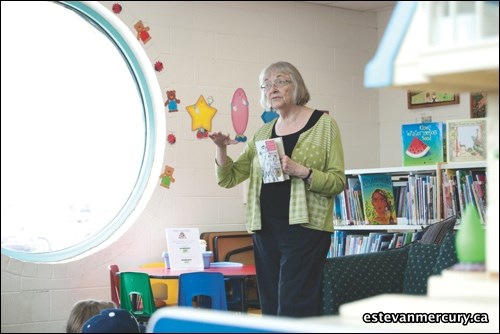With nearly 30 authors touring around Canada for Children's Book Week, Estevan youth were lucky enough to hear the stories of Celia Barker Lottridge.
Lottridge made a number of stops in Estevan schools on May 3, including an appearance at the library, where she told stories and answered the questions of Hillcrest School students from Grades 3 to 5.
Lottridge said after her presentation with the students that she became a librarian before writing, in large part because she loves to tell stories.
"For some reason I love telling stories," she said. "It kind of comes naturally for me."
She is quick to distinguish between telling stories and reading page-to-page to children. Having a book in front of her acts as a barrier, she said.
"It's easier for me to talk to children without a book in front of me because it's kind of a thing that's in between, so I hardly ever read (to an audience)."
She said because her audience is children, sharing stories is what they really care about. The story she shared with the children at the close of the session was The Name of the Tree, a story she's shared hundreds, perhaps thousands of times. She told it four times on Tuesday. With folk tales like that, she said stories don't need to be memorized and each telling can have it's own life because the storyteller is part of the process.
The choice to write children's books, as opposed to other tales, was a decision she made, but doesn't really know why.
"Well I know some reasons. Children's stories, you have to be economical. You can't write long paragraphs about what somebody thinks. I think I like that quality. I like that you have to make the story tell what it is you want to tell. You don't write about the hardships of pioneers, you just write about some pioneers in the bush. The other reason is I like the way children read. If they like a book, they kind of take it into themselves in a way a lot of adult readers don't."
There is one theme in particular that she often includes in her books, whether by conscious choice or not. The idea of having to travel by necessity is something that is at the centre of many of her stories.
"I very often, in my books, somebody has to move from one pace to another. And their children so they're not making the decision. I think that happened enough in my life that I can identify with that."
Lottridge's family moved a lot while she was growing, rarely staying in one place for more than a few years. With all that travel comes the experience of a new environment, and she considers herself a "magpie" because of such a life, getting a little experience here and there.
She noted one book she had written about children getting displaced in Iran in the First World War, Home is Beyond the Mountains, but said it couldn't be more different than one she'd written about a girl who has to go to Toronto from Saskatchewan.
"Usually that type of theme isn't even something you're aware of until you've written the book. It's absolutely true that you write about yourself, because who else can you write about? On some level you always are putting yourself into other people."
Lottridge is touring the province as part of Book Week, with a theme this year of Changing the World, One Child at a Time. She said she hopes for children, reading a book can take them out of themselves and help them identify with other people.
"It also just gives you information in a way that's much more absorbable. You can take it in. With children's books-no child is going to sit down and read a history of the First World War in Iran-but this book actually tells you a little bit about that, as it was experienced by real people. I think books expand people's lives."
As Lottridge is a children's writer, much of her concern can lean toward to the issues of bullying.
"I was thinking about this in terms of bullying," she said. "Bullies, I think, are people who really don't empathize with (the victim). They understand how they feel. They see the results, the other kid crying or unhappy, and they feel powerful. But they, themselves, can't really feel what it's like. I think reading books can help you because a book is not saying you have to do this. But if you relate to a character it expands your own perception into another person."
She recalls one boy who wrote her a letter in response to one of her stories, Ticket to Curlew, where the character had to move to Alberta. The boy in the letter said he had just moved and told her he knew exactly how the character in the book felt.
"It certainly dawned on me, 'That's why I write about it.' But I think for him, it made him understand himself better. That this other person in the book felt this way, it kind of helped him know this is the way people feel in this situation."
She said there are many ways to open up a child's world and noted some people write about how it feels to be a child soldier. She thinks a subject like that is for older children than who she writes for.
"What I tried to do (in Home is Beyond the Mountains) is really stick with what it was like for this nine-year-old, not talk a bout how terrible it was, not objectify the enemy. Just, this was her experience."
Lottridge said for her audience there needs to be some amount of hope in the end, even if the story is tragic.
"You have to end children's books with something that's hopeful," she said. "They can deal with tragedy, but they need to have somebody in the book who carries on."




